Tim Hollins and Mogs Russell founded a group based in Birmingham, UK, which for more than 30 years has accompanied Nueva Esperanza, a community etablished by returned refugees in the Bajo Lempa area of Usulután, El Salvador. Here they describe how this collaboration began, and its successful focus on supporting the community’s school and teachers.
In 1990, whilst working in Nicaragua, we met Armando, a disabled ex-combatant of the FMLN (Salvadorean guerrilla fighters) who was living and working in Managua. Through him we got to know refugee families, including his own, who were preparing to return home to El Salvador, as the peace negotiations to end the civil war dragged on. Armando was their elected co-ordinator for the repatriation process.
The group were very well organized, with committees for everything, but had little international support. So we did what we could, supporting their occupation of the Embassy of El Salvador and writing faxes of complaint to UNHCR in Geneva about the behaviour of their local staff. Eventually the refugees obtained their paperwork, and we went to the airport to see them off. As they waited to board, one of the women, Soledad, invited us to visit them in their new home. We took a deep breath – after all, the war was still going on – and accepted. One month later we travelled overland to the new community of Nueva Esperanza – New Hope.
After an extraordinary few days in terrible conditions, and with the sounds of combat in the distance, Armando called us into his champa – (a rudimentary tent) . He gave us a task: to return to Birmingham and seek support for the new community. For us it was overwhelming to experience the embryonic community struggling hard just to survive, and we fell in love with these new friends, with the Community, with their lucha, struggle.
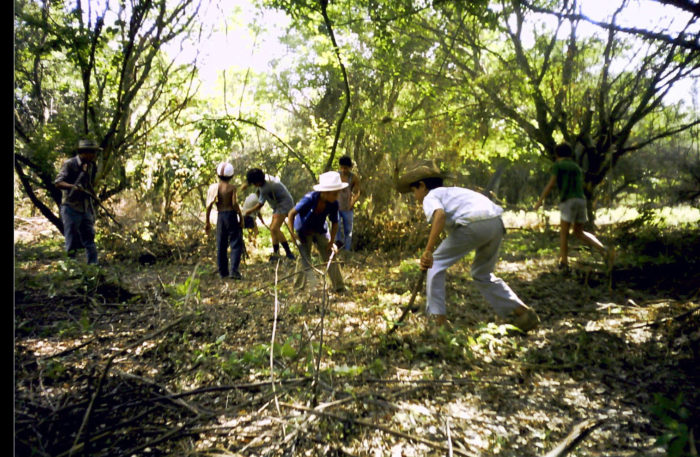
We agreed to support Nueva Esperanza for two reasons: first, because there were clearly so many needs; and secondly because we were excited and inspired by their courage and dynamism, their vision of a new way of living, and their high levels of organization and political awareness.
Support, solidarity and accompaniment
It made sense for us, coming from a richer country, to look for financial support, and as we were both teachers, we settled on supporting the community school, which at that time consisted simply of a cluster of chairs under the trees. Education was – and remains – one of their top priorities, after housing, agriculture and health. A slogan painted on their library wall reads, ‘An educated people is a free people’.
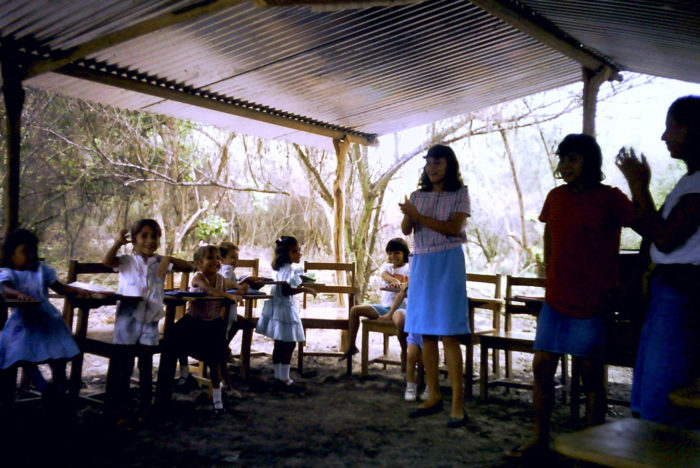
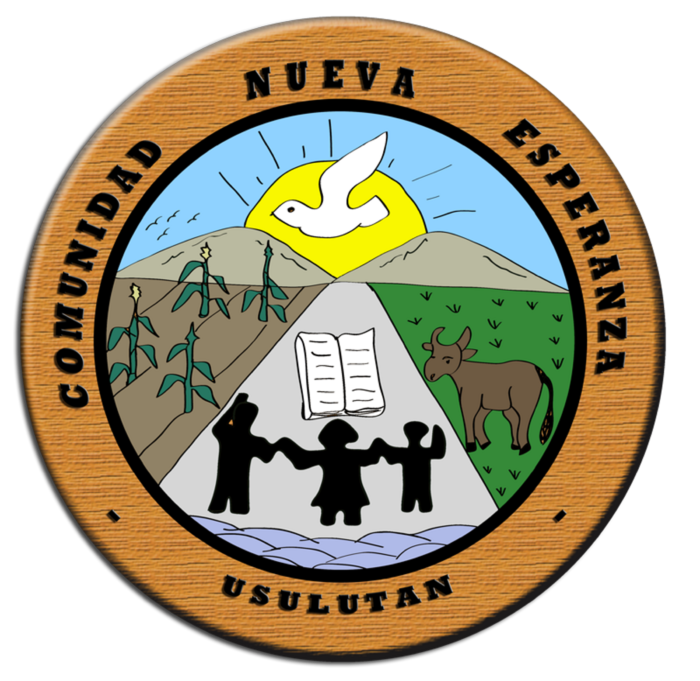
Money, however, while necessary, can cause all sorts of problems – and that led to a discussion on what solidarity is, and, just as important, what it is not. We agreed that solidarity is not charity, it is not a patronizing handout of a few crumbs from the rich to the poor with an expectation of gratitude. Neither is it an NGO that dictates and imposes conditions. We agreed that we trusted the Community to make appropriate decisions on how best to use any funds we sent them – a decision made easier by the fact that Nueva Esperanza had a very competent, experienced accountant, who was completely trusted by the Community.
When the Community refers to us and wants to acknowledge our support over 30 years, they talk about us ‘accompanying’ them. And that’s exactly what solidarity is – it is being alongside people, standing together in good times and in bad. Solidarity is based on mutual respect – and crucially, we feel, it is a two-way process where everyone benefits.
Nueva Esperanza receives both financial and moral support from us, and what we gain from our relationship with the Community is hope and inspiration. Here in Britain, we are constantly told that people are inherently greedy and selfish, that it is naïve to believe we can live together co-operatively and for the common good. Nueva Esperanza disproves that lie, and seeing the Community thrive on so many levels gives us hope that it is possible to build healthier, happier communities here – living proof that another world is possible.
Fund-raising in Birmingham
Back in Birmingham in 1992, we looked for ways to support the development of education in the Community. In Nicaragua we had got to know a women’s centre, where three local professional women were paid by a group of feminists from Italy who had organised monthly standing orders from friends, and sent these funds out to the women’s centre every six months. We copied their scheme, as it seemed easy to set up, and created regular amounts which could be planned for.
We organized slide shows, invited friends and encouraged those with regular salaries to sign up to a monthly standing order. This worked well, and within a few months we had about 10 signed up, and within a year about 25.
Educación popular
The school in the Community started with no resources, no equipment, no buildings, just a committed group of about eight teenagers giving classes to the younger children under the trees. This is ‘Educación Popular’ Popular or People’s Education, and the teachers were proud to call themselves ‘Educadores Populares’ – teachers operating outside the state education system, which most campesinos couldn’t access, and which in any case was reactionary, disparaged campesino history and culture, and ignored the causes of the civil war. (see video, including short interviews with teachers).
Our regular small contributions meant that the teachers could start to be paid a community wage for setting up and running the school; they could see this as their full time role in the new Community (as well as doing agricultural work) and could ensure that children received an education, based on Paulo Freire, which valued their lives and experiences, and which encouraged them to question and analyse what was happening in the country and also in the wider world.
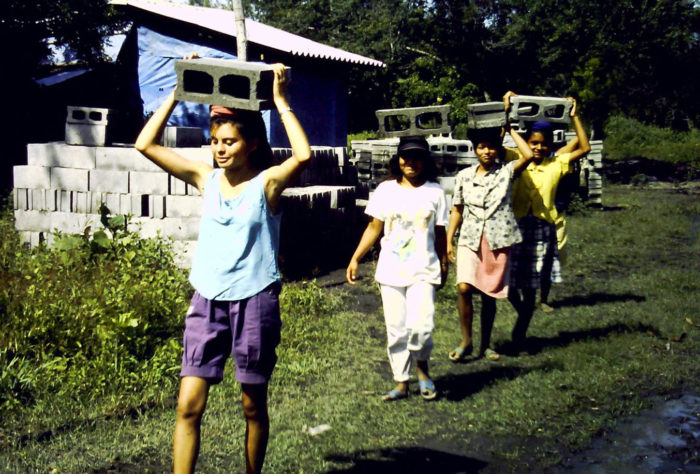
Over time we collected more standing orders, and working with a solidarity group based in Germany we were able to increase markedly their community wage. A large grant from the Canadian government paid for school buildings, with labour provided by the Community (they have become expert builders). And, in addition, the Community built and created the first rural community library in El Salvador.
Tardy government support
But both we and the Community agreed that it is the responsibility of the state to provide education, so after a number of years the teachers enrolled in weekend teacher training college, to become state qualified teachers.
The Ministry of Education constantly obstructed the development of the school and a long struggle ensued. The Ministry adopted divisive tactics by offering state salaries to the teachers one at a time, one per year, hoping that this would cause dissent, but that did not work.
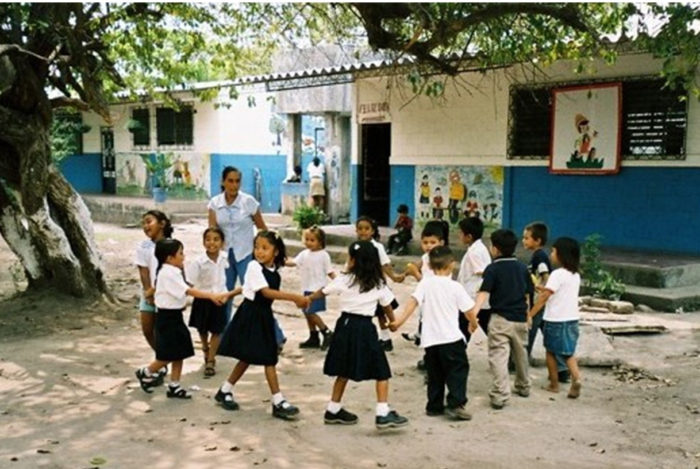
When the first teacher was awarded her salary, it was agreed to pool her wage and the community wages, and redivide so that all had a wage rise – a great example of working together and creating equality and solidarity. The teachers eventually won and were all finally awarded full state salaries – at that time about four times the original community wage!
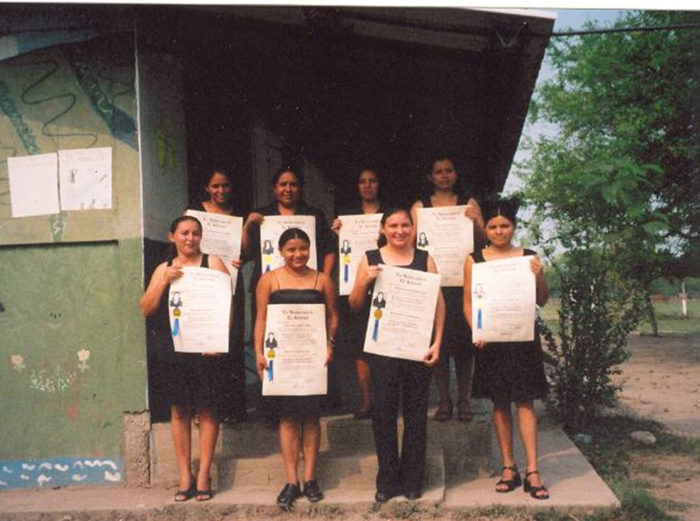
This didn’t mean that our monthly standing orders stopped: the funds then allowed the school to pay a wage to the science teacher, a member of the Community who had joined the staff a few years after the others.
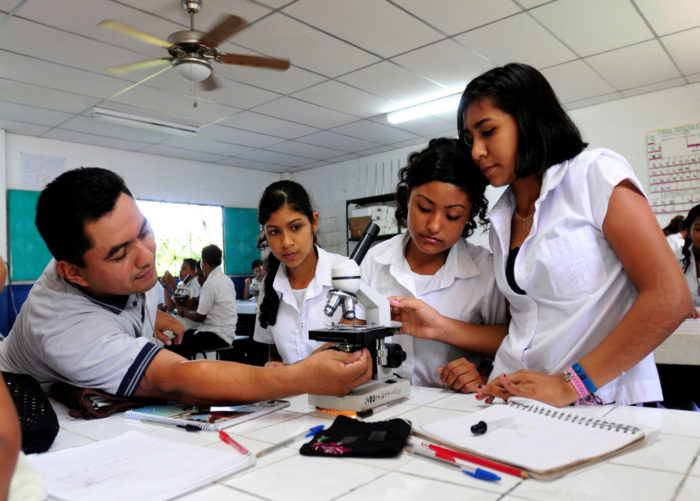
Obstacles and setbacks
Despite the dynamism, determination and organization of community members, there have been huge obstacles and many setbacks. Massive flooding in the region, raising water levels by two metres or more, meant they lost equipment and books on several occasions, though fortunately there was no loss of life, and they had to start from scratch again and again.
Gang violence and murders in the region resulted in parents keeping their children away from school at times; entire families were forced to flee the country, and those remaining were traumatized. This had a huge, negative effect on the school and the education programme it offered. Recently, Covid-19 swept through the area and country, and all schools were closed for over a year. Home learning was very challenging with little internet available, and with many parents having relatively low educational levels themselves.
But overall, today the school is flourishing: it has seven classrooms, a large multi-use hall, sports fields, a kitchen to provide school dinners and a science lab. It is fully part of the state education system, and caters for children not only from Nueva Esperanza, but also from some of the 29 other communities in the Bajo Lempa area. The teachers are all qualified, with a proper state salary – and they are a remarkably stable group who started working together in 1992. Our solidarity continues, now paying for a part-time remedial teacher who is supporting children who fell behind during lockdown.
Supporting the school was just one of the ways in which we showed solidarity with the Community. There were others, such as the emergency fund appeal after floods, supporting the community clinic, the agricultural co-operative and the ethical tourism project. We hope to describe these in our next article.
If you would like to know more, or wish to support the education process by a one off donation or monthly standing order, email mogstim@hotmail.com

